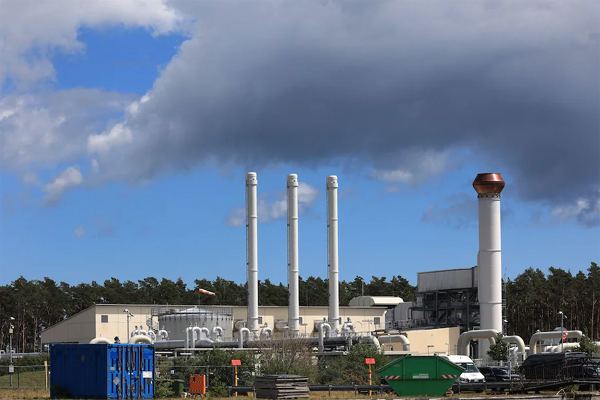
By Maria Tadeo
Vladimir Putin is sabotaging Europe’s energy supply, and the economic outlook looks grim. Isn’t that enough to get governments into emergency mode? And yet, the European finance ministers who bothered to show up in Brussels this week spouted their usual, calm one-liners: Europe is working on contingencies, an economic recession can still be avoided and it is impossible to predict whether Russia will maintain or cut gas flows altogether.
All plausible scenarios, of course. Except, Russia is very clearly weaponizing energy, sabotaging Europe’s summer storage and doing so to make sanctions so unpalatable that it forces the European Union to rethink its position on Ukraine.
I understand not wanting to create panic. However, sugarcoating won’t do Europe any good. Even without official warnings, the markets are already bracing for crisis. The euro has taken a battering since the invasion started, approaching parity with the US dollar; and German industry knows that a disruption in gas supplies not only means recession but also an existential crisis for “Made in Germany.”
Indeed, as EU finance ministers paraded their enervating string of plausible scenarios for the winter, the International Energy Agency rang its most severe alarm to date, suggesting the world is witnessing an unprecedented and complex energy crisis — and we may just be at the start of it. The language is scary but the tone matches the severity of the situation much better than the wishful thinking coming out of Brussels.
Hitting the right note is important because Europeans need to hear how serious the situation is. Without conserving enough gas now, Europe is not going to catch a breather in the winter. Governments must focus the minds of their people and prepare the right policy response. French Finance Minister Bruno Le Maire is one of the few to say Russia may cut off flows altogether to create maximum damage. He suggests Europe needs to come to terms with a full rupture and work on a plan to designate which sectors take priority in terms of energy use. He also suggested consumers will have to lower personal consumption — that means changing our daily habits.
It’s a difficult political posture, of course. There is growing public anger at the cost of living crisis and inflation. This is all exacerbated by Russia, part of its strategy to erode support for Ukraine by taking European industry to the breaking point. The EU must oppose this by taking control of the narrative — reminding citizens, institutions and corporations that this is a crisis manufactured by Putin and must be countered by a great deal of sacrifice.
You cannot sit still when you know a hurricane is about to hit. To prepare, European officials must answer vital questions. Are they — and their people — willing to take the economic pain? No war can be won on the cheap. Ukraine is no exception.
Is Europe willing to deploy more resources? We need the equivalent of Mario Draghi’s “whatever it takes” moment — when the then European Central Bank president helped stabilize the euro crisis in 2012. This time, it would cushion the impact of the war but also rally public support and instill a willingness to sacrifice. It will be a difficult task for any politician. But downplaying the problem won’t make it go away.
______________________________________________________
Maria Tadeo is the European correspondent for Bloomberg Television based in Brussels where she covers European politics, economics and NATO. @mariatad . Energiesnet.com does not necessarily share these views.
Editor’s Note: This article was originally published by Bloomberg Opinion, on July 14, 2022. All comments posted and published on EnergiesNet.com, do not reflect either for or against the opinion expressed in the comment as an endorsement of EnergiesNet.com or Petroleumworld.
Use Notice: This site contains copyrighted material the use of which has not always been specifically authorized by the copyright owner. We are making such material available in our efforts to advance understanding of issues of environmental and humanitarian significance. We believe this constitutes a ‘fair use’ of any such copyrighted material as provided for in section 107 of the US Copyright Law. In accordance with Title 17 U.S.C. Section 107. For more information go to: http://www.law.cornell.edu/uscode/17/107.shtml.
energiesnet.com 07 14 2022











